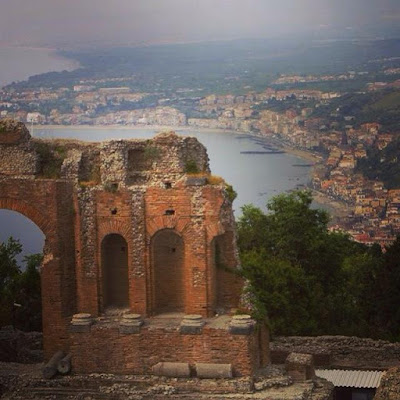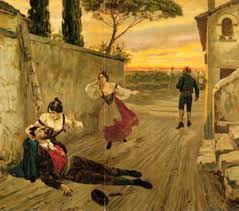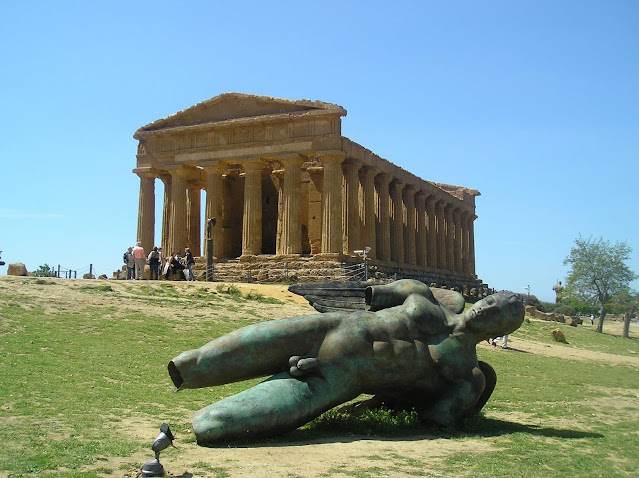Cavalleria Rusticana
Last weekend I went to visit the Teatro
Antico di Taormina, (the ancient Greek theatre of Taormina).
I visited just as the sun was starting to set behind a cloudy Mount
Etna. The previous night there had been a performance of Madame Butterfly and
another performance of this beautiful opera was to be performed again the
following night.
The Greek Theatre is the most perfect venue for operas as the stage has natural
scenery as background, Mount Etna and the Bay of Naxos can be seen through the ancient
columns behind the stage and orchestra pit and it has the most amazing acoustics.
Taormina Arte and Opera season is now in full swing.
Cavalleria Rusticana was the first performance I ever experienced at the
Greek theatre. It is a mesmerizing love story with a tragic ending and the most
haunting beautiful orchestral music to accompany it.
The Greek theatre is my favourite place in Taormina and I could sit
there for hours taking in the history and the spectacular views, so on this
balmy Sicilian summer evening I sat on one of the ancient steps for a moment and
thought about the story of Cavalleria Rusticana.
The opera was written by the composer Pietro Mascagni and was adapted
from a play and short story by Giovanni Verga.The story takes place in a 19th
century Sicilian village on Easter morning.
A young villager named Turiddu has returned from military service to
find that his fiancée Lola has married the local carter Alfio while he was
away.
In revenge, Turiddu seduces
Santuzza, a young woman in the village. As the opera begins, Lola, overcome by
her jealousy of Santuzza, has begun an adulterous affair with Turiddu.
The stage is set as the village main square. Offstage, Turiddu is heard
singing “O Lola, lovely as the
spring’s bright blooms" (O Lola c'hai di latti la cammisa). To one
side of the stage is the village church; to the other is Tirridu’s mother Lucia’s
wine shop and the house where he lives with her. The villagers move about the
square, singing of the beautiful spring day (Gli aranci olezzano sui verdi
margini ("The air is sweet with
orange blossoms").
Santuzza, having slept with Turiddu and suspecting that he has betrayed
her for Lola, is distraught and approaches Lucia as she comes out of her house.
Santuzza asks for Turiddu, but Lucia tells her that he has gone to another town
to fetch some wine. Santuzza then tells Lucia that Turiddu was seen during the night
in the village. Lucia asks her inside the house to talk, but just at that
moment Alfio arrives on his wagon, accompanied by the villagers. He sings
praising the joys of a carter’s life and the beauty of his bride Lola. Alfio
asks Lucia for some of her fine wine. She tells him it has run out and
Turiddu has gone away to buy more. Alfio replies that he had seen Turiddu early
that morning near his cottage. Lucia starts to express surprise, but Santuzza
stops her.
Alfio leaves and the villagers sing an Easter Hymn in the square, joined
by Santuzza. The villagers enter the church and Santuzza and Lucia remain
outside. Lucia asks Santuzza why she signaled her to remain silent when Alfio
said that he had seen Turiddu that morning. Santuzza exclaims, “Voi lo
sapete “ ("Now you shall know"), and tells Lucia the story of her
seduction by Turiddu and his affair with Lola. Lucia pities Santuzza, whom the
villagers are considering excommunicating for
her seduction. Santuzza cannot enter the church, but begs Lucia to go inside
and pray for her.
Turiddu then arrives. Santuzza berates him for pretending to have gone
away, when he was actually seeing Lola. Lola then enters the square singing.
She mocks Santuzza and goes inside the church.
Turiddu turns to follow Lola, but Santuzza begs him to stay. Turiddu
pushes her away and she clings to him. He loosens her hands, throws her to the
ground, and enters the church. Alfio arrives looking for Lola. Santuzza tells
him that his wife has betrayed him with Turiddu. Alfio swears to take vendetta
(revenge) which causes Santuzza to repent for having disclosed the affair and
begs Alfio to stop but to no avail.
The square is empty as the orchestra plays the famous Intermezzo.
The villagers come out of the church. Turiddu is in high spirits because
he is with Lola and Santuzza appears to have gone. He invites his friends to
his mother’s wine shop where he sings a drinking song, “Viva, il vino
spumeggiante” ("Hail to the bubbling wine"). Alfio joins them.
Turiddu offers him wine, but Alfio refuses it. The villagers understand that
trouble is in the air, the women leave, taking Lola with them.
In a brief exchange of words, Alfio challenges Turiddu to a duel.
Following Sicilian custom, the two men embrace, and Turiddu, in a token of
acceptance, bites Alfio’s ear, drawing blood which signifies a fight to the death.
Alfio leaves and Turiddu calls Lucia back. He tells his mother that he is going
outside to get some air and asks that she be a kindly mother to Santuzza if he
should not return: “Un bacio, mamma! Un altro bacio! Addio!” – "One
kiss, mother! One more kiss! Farewell!".
Turiddu rushes out. Lucia, weeping, wanders aimlessly around outside her
house. Santuzza approaches and throws her arms around her. The villagers start
to crowd around. Voices are heard in the distance and a woman cries, "They
have murdered Turiddu!" Santuzza faints and Lucia collapses in the arms of
the women villagers. The women then all raise their shawls to cover their
heads.
The End.
The opera is also famous for being used in the movie The Godfather Part
III, when Michael Corleone’s son Anthony gets the part of Turiddu at a
performance of the opera at the Teatro Massimo in Palermo. The whole family
travel to Sicily to watch him.
The movie ends tragically when after Vincent seeks revenge during the
performance an assassin dressed as a priest and armed with a sniper rifle
descends upon the opera house to murder Michael and ends up eliminating three
of Vincent’s men but is unable to shoot Michael. The assassin retreats to the opera house steps
outside. As the family leave the opera house he fires twice, intending to
murder Michael but kills Michael’s beloved daughter Mary instead. At this point
the Intermezzo from the opera is played as the family mourn the death of Mary
and the scene changes to an elderly Michael remembering all the women which he
has lost in his life.
“Taormina … The Greek Theatre”
“The Godfather Movie Locations”
Taormina Cult … 21 Places The Muses Made Their Home” http://whitealmond-privatesicily.blogspot.com/2015/08/taormina-cult-21-places-muses-made.html
Now Explore the Greek Theatre with me
as it prepared for a performance of Madame Butterfly
Thank you for following
White Almond Sicily Blogspot
Keep posted for new exciting posts
Follow me on Facebook:
also on
Twitter, Instagram and Pinterest


























